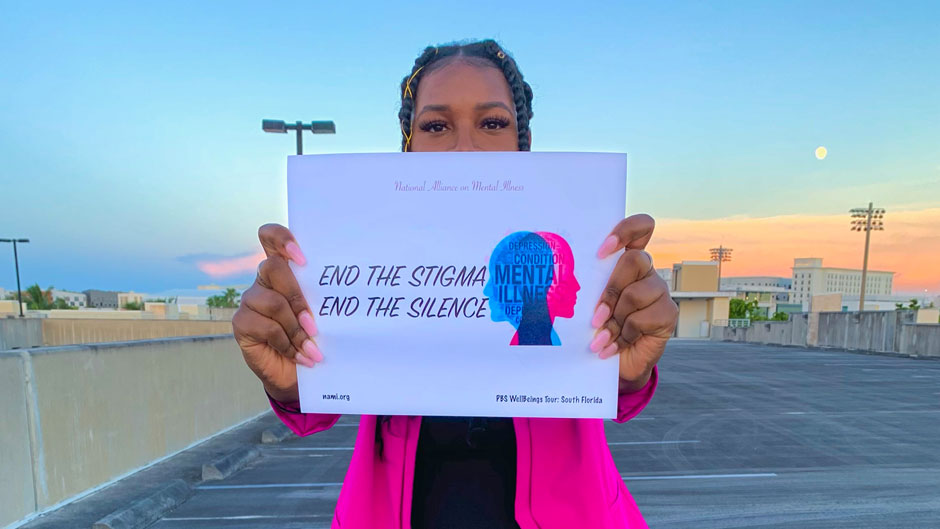For Krishna Louis, sharing her personal battle with depression, anxiety, and post-traumatic stress disorder has brought her a multitude of new opportunities. Recently, Louis was invited to share her story at the Well Beings Tour, a virtual panel discussion hosted by PBS South Florida.
Like many of her peers, Louis has to find ways to cope with the increased mental health challenges related to the COVID-19 pandemic. In her final year at the University of Miami, Louis said trying to manage isolation and an altered semester because of the pandemic has encouraged her to share her coping mechanisms.
“Everybody’s going through things—no matter if you’re rich or poor,” said Louis, who is from Palm Coast, Florida. “I hope that sharing my story and my experience will help bring awareness and educate as well.”
A survivor of sexual assault, Louis’ outstanding work as the University’s peer education co-chair for It’s On Us—an initiative launched in 2014 by the Obama-Biden administration to prevent sexual assault by engaging and educating young men and changing campus culture—led her to be selected as a youth lead presenter for the National Alliance on Mental Illness.
Channeling her past pain into triumph, Louis takes pride in being able to share what helped her heal and be the woman she is today. Being a part the national campaign tour gave Louis a platform to help bring awareness to mental health outcomes that have increased, especially in young adults lately, according to the Centers for Disease Control and Prevention.
“We are incredibly proud of Krishna for showing dedication to spread awareness about topics that impact us all individually and as a collective society,” said Kimberly Martin, assistant director of outreach services for the University of Miami Counseling Center. “When a student takes initiative to educate others as Krishna has, we all benefit. Leading by example is imperative for one in the role of peer educator. We applaud Krishna for the example she is setting and hope that this inspires others to become engaged in serving the University of Miami community.”
Louis’ passion for educating others doesn’t end at bringing awareness to mental health and sexual assault. She is also an HIV testing counselor for the Florida Department of Health.
“Basically, I am very involved in things that are very important and that many people do not feel comfortable talking about,” said Louis. “But, having someone to discuss these topics with helped me cope, so I want to be there for others now.”
Since her first year in college, Louis said she experienced emotions and anxiety she had never faced before. For years, her friends and family encouraged her to seek professional help, but she felt she could deal with things on her own.
“It’s very important for people to know that, people who need therapy aren’t going to listen to their family and friends when they tell them they need therapy,” said Louis. “People have to accept it in their own time.”
Louis revealed that one day, while in a crisis, she visited the University’s Counseling Center with “low expectations.” Within minutes of meeting with her assigned therapist, she felt comfortable to reveal the grappling emotions she constantly felt.
“My therapist has been the best support that I have ever had,” said Louis, referring to Kirt McClellan, the center’s assistant director. “He’s the reason why I’m so involved in the things I am involved with now. He has helped guide and uplift me on my journey.”
Audrey Cleary, staff psychologist and Sexual Assault Resource Team (SART) coordinator, said that during this pandemic period, it would be good to reach out to those in your networks in ways that are safe: text, email, Zoom calls or activities, planned around the time when you have energy to do it—Zoom fatigue is real.
“During this time, it can be good to check with yourself what you are missing about your social life. This can remind you of the support you have in your life, even if far away,” said Cleary. “Maybe you can find new ways to bond with the people in your household. Regardless, focus on self-care: good sleep, nutrition, physical activity, and making time to do things that you like to do alone. Be patient with yourself—it is normal to feel lonely sometimes and doesn’t mean that you are alone.”
The Counseling Center is providing students with continued care through a Telemental Health Option, either over the phone or by videoconferencing. In-person sessions are not being provided at this time. Make an appointment.
The app WellTrack, which can be accessed through the Counseling Center website, also offers useful exercises to deal with stress.

